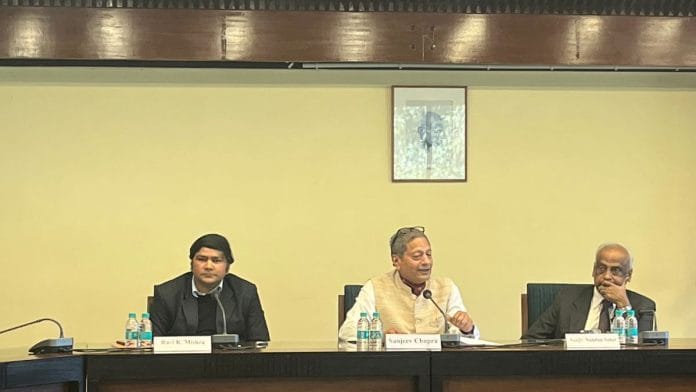New Delhi: India will not be united if it does not have a good All-India Service, which has the independence to speak out its mind, which has a sense of security, integrity, and impartiality, said Sardar Vallabhbhai Patel. Over seven decades after India’s first home minister made these observations, Sanjeev Chopra, former director of the Lal Bahadur Shastri National Academy of Administration, invoked Patel before an audience gathered to listen to his lecture on the ‘Iron Man of India’.
On a sunny afternoon, around 70 people gathered in the Prime Minister’s Museum and Library to listen to Chopra’s lecture on the legacy of Sardar Vallabhbhai Patel and his relevance to India’s civil services.
From retired government officers to young students and scholars, the audience intently listened to Chopra talk about civil services during British rule and even the current times.
“In British rule, Indians had 40 per cent of reservation. The exam used to be held in England and when more and more Indians started taking it, it started happening in India. The first exam was held in Allahabad,” Chopra said.
The decision to form an Indian Administrative Service (IAS) and an Indian Police Service (IPS) was taken by the Central Cabinet during the Premier’s Conference in 1946. In this meeting, premiers (now chief ministers), revenue ministers, and chief secretaries, along with Sardar Patel, debated whether to establish a central service or allow individual provinces to have their own administrative machinery. Patel strongly supported the idea of an All-India Service to maintain administrative uniformity, and ensure a seamless liaison between the Centre and the states.
However, some people, including the Americans at the time, perceived the civil services as a tool for colonial exploitation of India’s people and resources – a notion that Patel changed, asserted an attendee.
“From the steal frame to the steel frame – that’s the big transformation Sardar Patel was able to bring about. And that is why he is, I would say, the Bhishm Pitamah of the civil services.”
Sardar Patel’s vision
According to Chopra, Sardar Patel viewed a unified service as key to upholding administrative standards, and keeping the central government connected to the nation’s states and grassroots.
But the practice has faced resistance in modern times, as some chief ministers have been reluctant to send officers to the Centre for deputation in central government departments.
“Unfortunately, some chief ministers in the country, including my ex-chief minister, are very reluctant to send officers to the center,” said Chopra in reference to West Bengal, where he served as an IAS officer for many years.
Chopra then mentioned the warning Patel had given to civil servants: “If you want to keep the independence of the country, you must not let your service be enslaved by politicians.”
The former director of the LBSNAA IAS academy said that civil servants must navigate their roles with integrity, ensuring that governance remains people-centric. Chopra urged serving IAS and IPS officers to revisit Patel’s vision, emphasising that a strong, independent, and ethical civil service remains the cornerstone of a functioning democracy. “The spirit of Patel should inspire every officer who takes the oath to serve the nation,” he said.
The lecture was followed by a lengthy round of questions where many wanted Chopra to stress on the kind of pressures civil servants face while working with politicians.
“I have said this multiple times that I have worked with Congress, BJP, UPA, NDA, TMC and I have never felt any political pressure. It depends on the officer.”
(Edited by Zoya Bhatti)






